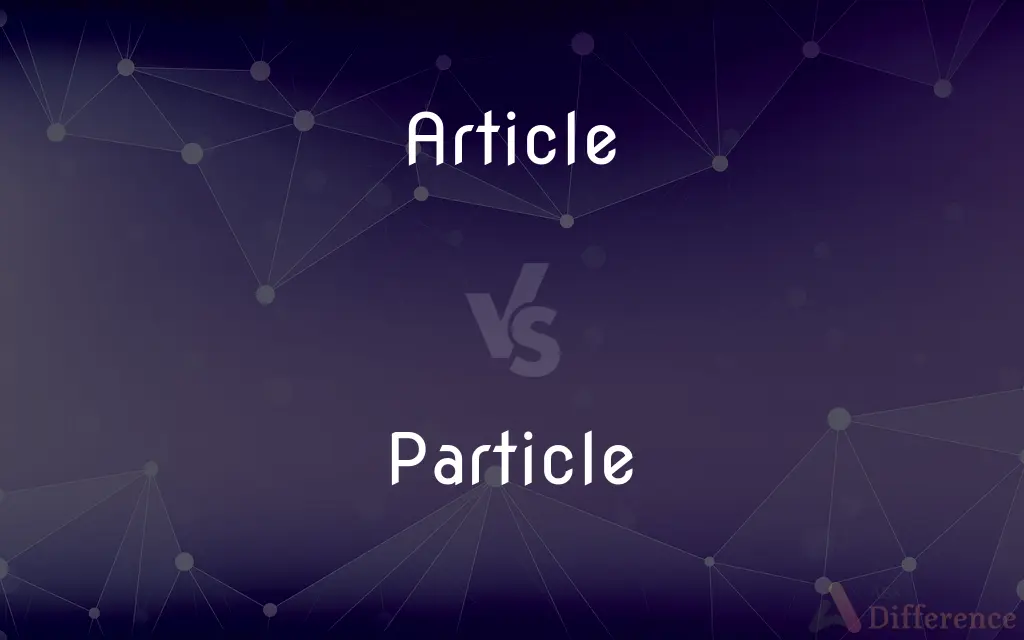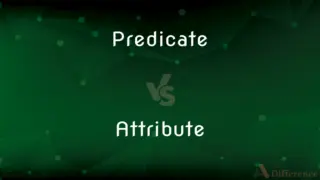Article vs. Particle — What's the Difference?

Difference Between Article and Particle
ADVERTISEMENT
Compare with Definitions
Article
A particular item or object
Small household articles
Articles of clothing
Particle
In the physical sciences, a particle (or corpuscule in older texts) is a small localized object to which can be ascribed several physical or chemical properties, such as volume, density, or mass. They vary greatly in size or quantity, from subatomic particles like the electron, to microscopic particles like atoms and molecules, to macroscopic particles like powders and other granular materials.
Article
A piece of writing included with others in a newspaper, magazine, or other publication
An article about middle-aged executives
Particle
A very small piece or part; a tiny portion or speck.
Article
A separate clause or paragraph of a legal document or agreement, typically one outlining a single rule or regulation
It is an offence under Article 7 of the Treaty
ADVERTISEMENT
Particle
A very small or the smallest possible amount, trace, or degree
Not a particle of doubt.
Article
A period of training with a firm as a solicitor, architect, surveyor, or accountant
It may be worth taking articles in a specialized firm
He is already in articles
Particle
A body whose spatial extent and internal motion and structure, if any, are irrelevant in a specific problem.
Article
The definite or indefinite article.
Particle
See elementary particle.
Article
Bind (a trainee solicitor, architect, surveyor, or accountant) to undergo a period of training with a firm in order to become qualified
He was articled to a firm of solicitors in York
Particle
See subatomic particle.
Article
An individual thing or element of a class; a particular object or item
An article of clothing.
Articles of food.
Particle
An uninflected item that has grammatical function but does not clearly belong to one of the major parts of speech, such as up in He looked up the word or to in English infinitives.
Article
A particular section or item of a series in a written document, as in a contract, constitution, or treaty.
Particle
In some systems of grammatical analysis, any of various short function words, including articles, prepositions, and conjunctions.
Article
A nonfictional literary composition that forms an independent part of a publication, as of a newspaper or magazine.
Particle
(Ecclesiastical) A portion or fragment of the Eucharistic host.
Article
The part of speech used to indicate nouns and to specify their application.
Particle
(Archaic) A small part of something written, such as a clause of a document.
Article
Any of the words belonging to this part of speech. In English, the indefinite articles are a and an and the definite article is the.
Particle
A very small piece of matter, a fragment; especially, the smallest possible part of something.
Article
A particular part or subject; a specific matter or point.
Particle
(physics) Any of various physical objects making up the constituent parts of an atom; an elementary particle or subatomic particle.
Article
To bind by articles set forth in a contract, such as one of apprenticeship.
Particle
(linguistics) A part of speech that has no inherent lexical definition but must be associated with another word to impart meaning, often a grammatical category: for example, the English word to in a full infinitive phrase (to eat) or O in a vocative phrase (O Canada), or as a discourse marker (mmm).
Article
A piece of nonfictional writing such as a story, report, opinion piece, or entry in a newspaper, magazine, journal, dictionary, encyclopedia, etc.
Particle
(linguistics) A part of speech which cannot be inflected.
Article
An object, a member of a group or class.
An article of clothing
A sales article
Particle
(Christianity) In the Roman Catholic church, a crumb of consecrated bread; also the smaller breads used in the communion of the laity.
Article
(grammar) A part of speech that indicates, specifies and limits a noun (a, an, or the in English). In some languages the article may appear as an ending (e.g. definite article in Swedish) or there may be none (e.g. Russian, Pashto).
Particle
A little bit.
Article
A section of a legal document, bylaws, etc. or, in the plural, the entire document seen as a collection of these.
The Articles of War are a set of regulations...to govern the conduct of...military...forces
Particle
A minute part or portion of matter; a morsel; a little bit; an atom; a jot; as, a particle of sand, of wood, of dust.
The small size of atoms which uniteTo make the smallest particle of light.
Article
A genuine article.
Particle
Any very small portion or part; the smallest portion; as, he has not a particle of patriotism or virtue.
The houses had not given their commissioners authority in the least particle to recede.
Article
A part or segment of something joined to other parts, or, in combination, forming a structured set.
Each of the chelicerae is composed of two articles, forming a powerful pincer.
Particle
A crumb or little piece of consecrated host.
Article
A person; an individual.
A shrewd article
Particle
A subordinate word that is never inflected (a preposition, conjunction, interjection); or a word that can not be used except in compositions; as, ward in backward, ly in lovely.
Article
(archaic) A wench.
She's a prime article (whip slang), she's a devilish good piece, a hell of a goer.
Particle
An elementary particle.
Article
(dated) Subject matter; concern.
Particle
(nontechnical usage) a tiny piece of anything
Article
(dated) A distinct part.
Particle
A body having finite mass and internal structure but negligible dimensions
Article
(obsolete) A precise point in time; a moment.
Particle
A function word that can be used in English to form phrasal verbs
Article
(transitive) To bind by articles of apprenticeship.
To article an apprentice to a mechanic
Article
(obsolete) To accuse or charge by an exhibition of articles or accusations.
Article
To formulate in articles; to set forth in distinct particulars.
Article
A distinct portion of an instrument, discourse, literary work, or any other writing, consisting of two or more particulars, or treating of various topics; as, an article in the Constitution. Hence: A clause in a contract, system of regulations, treaty, or the like; a term, condition, or stipulation in a contract; a concise statement; as, articles of agreement.
Article
A literary composition, forming an independent portion of a magazine, newspaper, or cyclopedia.
Article
Subject; matter; concern; distinct.
A very great revolution that happened in this article of good breeding.
This last article will hardly be believed.
Article
A distinct part.
The articles which compose the blood.
Article
A particular one of various things; as, an article of merchandise; salt is a necessary article.
They would fight not for articles of faith, but for articles of food.
Article
Precise point of time; moment.
This fatal news coming to Hick's Hall upon the article of my Lord Russell's trial, was said to have had no little influence on the jury and all the bench to his prejudice.
Article
One of the three words, a, an, the, used before nouns to limit or define their application. A (or an) is called the indefinite article, the the definite article.
Article
One of the segments of an articulated appendage.
Article
To formulate in articles; to set forth in distinct particulars.
If all his errors and follies were articled against him, the man would seem vicious and miserable.
Article
To accuse or charge by an exhibition of articles.
He shall be articled against in the high court of admiralty.
Article
To bind by articles of covenant or stipulation; as, to article an apprentice to a mechanic.
Article
To agree by articles; to stipulate; to bargain; to covenant.
Then he articled with her that he should go away when he pleased.
Article
Nonfictional prose forming an independent part of a publication
Article
One of a class of artifacts;
An article of clothing
Article
A separate section of a legal document (as a statute or contract or will)
Article
(grammar) a determiner that may indicate the specificity of reference of a noun phrase
Article
Bind by a contract; especially for a training period
Share Your Discovery

Previous Comparison
Predicate vs. Attribute
Next Comparison
Smell vs. Sting














































